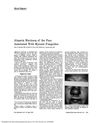 August 2007 in “Contact Dermatitis”
August 2007 in “Contact Dermatitis” A woman had an allergic skin reaction to a hair loss treatment containing canrenone.
 March 1998 in “Journal of Dermatological Science”
March 1998 in “Journal of Dermatological Science” Combining RU58841 and minoxidil significantly increases hair growth.
 3 citations,
January 2020 in “Acta Dermato Venereologica”
3 citations,
January 2020 in “Acta Dermato Venereologica” Netherton Syndrome can cause severe skin lesions in rare cases.
 September 2010 in “Reactions Weekly”
September 2010 in “Reactions Weekly” A woman was allergic to 5% minoxidil, with stronger reactions to higher concentrations.
 7 citations,
July 2020 in “Dermatologic Therapy”
7 citations,
July 2020 in “Dermatologic Therapy” During the COVID-19 pandemic in Turkey, the most common skin problem for both kids and adults was acne.
 5 citations,
September 2011 in “Journal of the American Academy of Dermatology”
5 citations,
September 2011 in “Journal of the American Academy of Dermatology” A patient's skin eruption was caused by the cancer drug cyclophosphamide and improved after stopping the drug.
 13 citations,
January 1988 in “Contact Dermatitis”
13 citations,
January 1988 in “Contact Dermatitis” Some patients using Minoxidil for baldness developed allergic skin reactions.
 28 citations,
May 1978 in “Archives of dermatology”
28 citations,
May 1978 in “Archives of dermatology” Alopecia mucinosa on the face can be linked to mycosis fungoides, a type of lymphoma.
 21 citations,
June 2017 in “Journal of The American Academy of Dermatology”
21 citations,
June 2017 in “Journal of The American Academy of Dermatology” Topical DPCP is somewhat effective for hair loss in alopecia areata, but more research is needed.
 33 citations,
November 2014 in “Military Medicine”
33 citations,
November 2014 in “Military Medicine” The U.S. military's teledermatology program was effective in providing fast and successful skin care in remote locations, preventing unnecessary evacuations.
 22 citations,
April 1985 in “Australasian Journal of Dermatology”
22 citations,
April 1985 in “Australasian Journal of Dermatology” Beta-blockers can cause rare skin side-effects, which usually improve after stopping the medication.
 29 citations,
August 1985 in “Contact Dermatitis”
29 citations,
August 1985 in “Contact Dermatitis” Minoxidil can cause allergic reactions like burning, itching, and red bumps.
 2 citations,
January 2016 in “Springer eBooks”
2 citations,
January 2016 in “Springer eBooks” The book is a useful guide for dermatologists studying for their board exam, with clinical images and features of skin diseases.
 April 2024 in “Journal of asthma and allergy”
April 2024 in “Journal of asthma and allergy” Abrocitinib effectively treated severe atopic dermatitis and mild alopecia areata in a 12-year-old boy after dupilumab failed.
 12 citations,
June 2010 in “Journal of dermatology”
12 citations,
June 2010 in “Journal of dermatology” Some patients with severe alopecia areata developed skin darkening from their treatment, which may indicate a less effective response to the therapy.
14 citations,
January 1995 in “Archives of Physical Medicine and Rehabilitation” A patient developed excess hair and skin issues on the same side after wearing a cast.
3 citations,
January 2012 in “Journal of cosmetics, dermatological sciences and applications” Many Iraqi patients had skin problems at the site where a vein was taken for heart surgery.
17 citations,
January 2012 in “European Journal of Pharmaceutics and Biopharmaceutics” Isoconazole nitrate stays effective in skin and hair follicles for up to two weeks after use.
 39 citations,
May 2004 in “Clinics in Dermatology”
39 citations,
May 2004 in “Clinics in Dermatology” The document concludes that treatment for cutaneous T-cell lymphoma should be customized to each patient's disease stage, balancing benefits and side effects, with no cure but many patients living long lives.
10 citations,
October 2011 in “Dermatologica Sinica” A patient with PPP had rare skin reactions to adalimumab, which improved after stopping smoking and continuing acitretin.
21 citations,
December 2014 in “Clinics in dermatology” Squaric acid dibutylester effectively treats alopecia areata.
December 2020 in “American Journal of Transplantation” Early recognition and treatment of VATS in transplant patients improve outcomes.
 9 citations,
November 2008 in “Journal of Cosmetic Dermatology”
9 citations,
November 2008 in “Journal of Cosmetic Dermatology” Artificial hair implantation is generally safe and can restore hair when other treatments fail, but some patients may experience side effects.
 41 citations,
December 2016 in “International Journal of Women's Dermatology”
41 citations,
December 2016 in “International Journal of Women's Dermatology” Hormone therapy and surgeries for transgender individuals affect their skin and hair, requiring specific dermatologic treatments and respectful care.
 3 citations,
March 2019 in “Contact Dermatitis”
3 citations,
March 2019 in “Contact Dermatitis” Using Indian marking nut sap for hair loss caused a skin rash on a woman's face.
 41 citations,
November 1993 in “Journal of The American Academy of Dermatology”
41 citations,
November 1993 in “Journal of The American Academy of Dermatology” DPCP helps treat severe hair loss, but 5% minoxidil doesn't add benefits.
 23 citations,
July 2008 in “British journal of dermatology/British journal of dermatology, Supplement”
23 citations,
July 2008 in “British journal of dermatology/British journal of dermatology, Supplement” Topical contact sensitizers can treat certain skin conditions but are rarely used in the U.K.
 98 citations,
November 2002 in “Contact Dermatitis”
98 citations,
November 2002 in “Contact Dermatitis” Many people had severe allergic reactions to a common hair dye ingredient, causing them to seek medical care and miss work.
 34 citations,
September 1992 in “Journal of the American Academy of Dermatology”
34 citations,
September 1992 in “Journal of the American Academy of Dermatology” Dermatologists need to know about cosmetics to help patients with skin issues and recommend safe products.
 6 citations,
May 1987 in “Acta dermato-venereologica”
6 citations,
May 1987 in “Acta dermato-venereologica” Syphilis patients showed abnormal hair root changes, with no difference between primary and secondary stages.
























